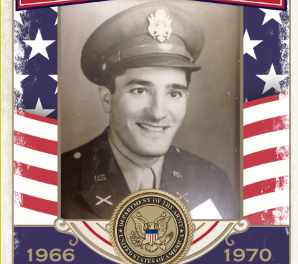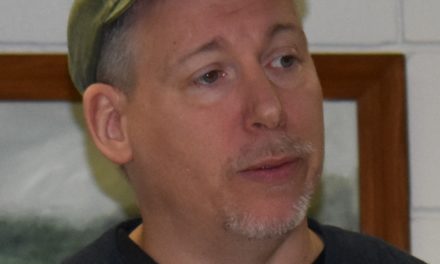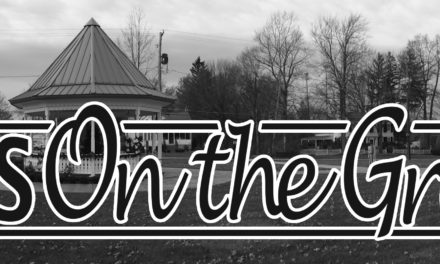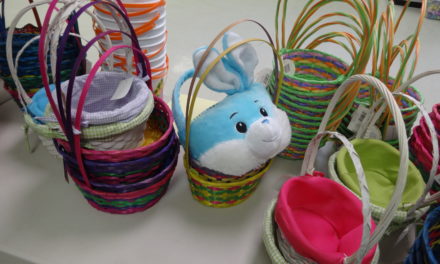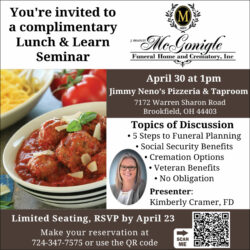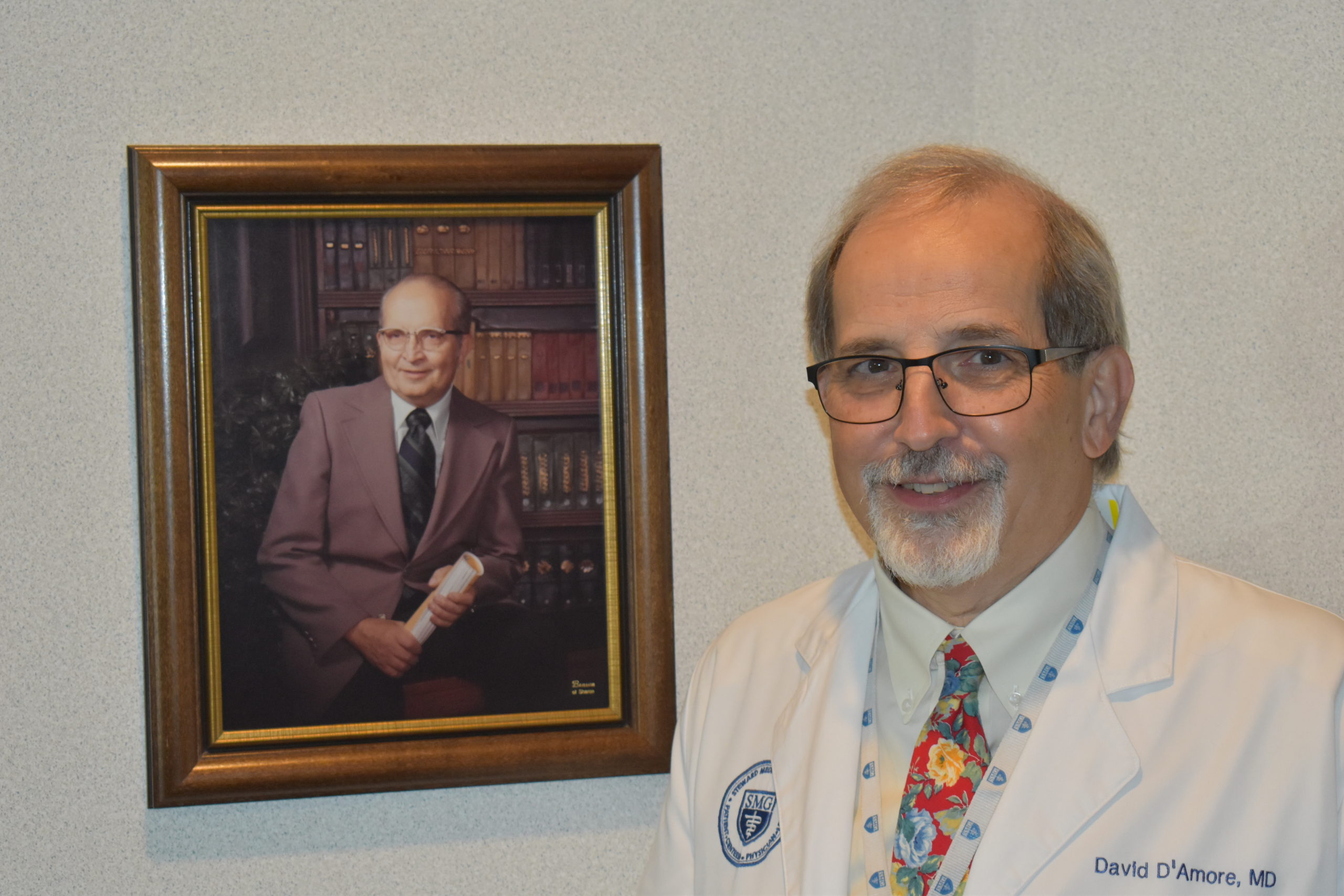
Dr. David D’Amore, who this year marked 40 years practicing medicine, stands with a photo of his father, Dr. Amanto D’Amore, who practiced for 61 years.
It was July 4, 1980. Dr. David D’Amore had just moved back into the area to start practicing medicine with his father, Dr. Amanto D’Amore.
“I remember we were having our Fourth of July picnic and he (Amanto D’Amore) got called to the emergency room,” David D’Amore said. “He said, ‘You go take care of it.’ I walk into the emergency room, they go, ‘Who are you?’ I go. ‘I’m Dr. D’Amore.’ They go, ‘No, you’re not.’ ‘I am Dr. D’Amore. Here’s my license.’ That’s how I got introduced.”
Dr. Amanto D’Amore cast a very long shadow over Shenango Valley medicine during his 61 years of practice, much of it based out of Masury. It took a while for his son to establish his own medical credentials, but he now stands on his own after 40 years in practice.
“The first 16 years of my practice, he was always around the corner,” David D’Amore said of his father. “They (patients) would come see me, I would write a prescription and I’d watch them go down the hall and stop at my dad’s office. And he would look at it. (Nods head yes.) ‘That’s OK.’ At the end of his career, they’d walk out of his office with a prescription, come over to me, and I’d say, ‘Yeah, that’s the one.’”
David D’Amore, 67, of Brookfield, does not shy away from talking about his father or acknowledging the influence his father had on his career choice and his decision to remain in Brookfield. His office has many photos of his father and artifacts such as the exam table his father used.
“He was obviously my mentor,” David D’Amore said.
Amanto D’Amore was a native of central Italy who moved to Youngstown in 1919, when he was 10. He studied medicine at Ohio State University and set up a practice at Elm and Miller streets in 1934, just after the start of the Great Depression.
“During the depression, he used silver forks, bent them to be retractors and sterilized them,” David said. “You couldn’t afford to buy your regular tools, but they worked. He had an autoclave and he made his own tools. A lot of creativity in those doctors in those days. They invented a lot of the things we take for granted.”
Amanto, whose younger brothers Adanto and Arcangelo also were medical doctors, was drafted into the Army during World War II, something that distressed his patients.
“The people in Masury signed a letter,” David said. “They didn’t want him to go to war. But, that was the war – they all went to war.”
Amanto served five years in the medical corps, mostly in Australia. After he was discharged, he resumed his practice in Masury, and helped found the former St. Bernadette’s Roman Catholic Church, where he met his future wife, Florence Shutrump, whose father built the church.
“My dad was introduced to her (mom) through the pastor of St. Bernadette’s,” David said.
David was the first born of eight kids, and the family was folded into Amanto’s work, taking his calls from the family home, answering patient questions on matters such as office hours and helping Amanto with his accounting.
“That’s where I learned to drive – I drove him on his house calls,” David said. “My dad was always family first, but you couldn’t tell because he considered his patients his family, too. That was just his style.”
David attended Warren Kennedy High School and John Carroll University before following in his father’s footsteps to medical school at Ohio State.
“If I didn’t have my dad to come back to, I probably would have stayed in Columbus,” David said. “I might have specialized more, too.”
While Amanto, who died in 2010 at age 100, was a general practitioner, which included delivering babies, pediatrics, visiting nursing homes and 40 years as the Brookfield school physician, his son studied internal medicine, a specialization that deals only with adults.
“It’s mostly diagnosing and managing long-term problems,” David said. “Mostly I see diabetics and hypertensives and lung patients and arthritic patients. Most of my patients are seniors, and I still go to nursing homes and take care of patients there.”
Up until recent years, David D’Amore was more hospital-based than his father, working a lot with intensive care patients. He also assumed a leadership role within what is now Sharon Regional Medical Center, including sitting on “almost every committee they have,” chairing the medicine department (surgery is the other department, and he doesn’t perform surgeries), and sitting on the hospital’s board of directors.
Although recruiting doctors is always an issue, the doctors who come here find plenty of work to challenge them, he said.
 “They like our community because you can see everything here,” David D’Amore said. “I always tell them you can find every kind of disease here you need to watch over. It’s not a boring place to practice medicine. It has a little slower pace than the city.”
“They like our community because you can see everything here,” David D’Amore said. “I always tell them you can find every kind of disease here you need to watch over. It’s not a boring place to practice medicine. It has a little slower pace than the city.”
Medicine has changed drastically in the 40 years David D’Amore has practiced, starting with computerization.
“I spend the most of my day on the computer,” said the father of four and grandfather of eight.
Medications such as statins that are commonplace today are recent additions. Surgeries are less invasive, and advances in cardiology with stents and angioplasties have revolutionized treatment, he said.
David D’Amore also finds himself seeing patients remotely through telehealth applications such as FaceTime and Google Duo now that the COVID-19 pandemic has reduced the desire for in-patient visits. It works for reviewing medications and getting health histories, but not when a physical exam is needed, he said.
“Half what I do is really counseling, answering questions,” David D’Amore said. “Now that I’m not doing hospital work, I’m spending my day explaining what they did to the patient in the hospital. I can pretty much do that on a video call. I kind of follow my dad’s attitude about teaching people. He always said, ‘If they know why they’re doing something, they’ll more likely follow your orders, rather than just giving orders.’ We try to help them understand why they have to do things.”
“Dr. Google,” as he called information available on the internet, has changed the expectations people sometimes have when they seek medical care, he said.
“I better be on my game,” David D’Amore said.
Staying on top of his game plays a big role in determining how long he will remain in practice.
“My dad set the bar too high. I don’t think I can go 61 years in practice. I don’t know how long I can last. As long as I’m helping people, I guess that’s my bottom line. When I feel like I’m not really adding to their care, then I’ll probably drop off.”

